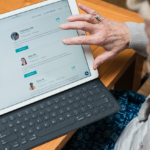Adverse drug reactions happen, for the most part, because of the number of medications taken and the different times of day each medication needs to be taken.
Elderly patients, on average, take 3 times as much medication as younger people.
Amongst the wide range of drugs taken by these patients, the most common are those battling heart conditions, augmented cholesterol levels, sleep disorders and depressions. Combining these different therapies, although necessary, isn’t without risk in terms of side effects, also known as adverse drug reactions (ADRs) or adverse events.
Reasons for adverse events
There are both preventable and non-preventable reasons for ADRs.
Non-preventable
We see that as we grow older our body’s absorption, distribution, and metabolic efficiency decreases, thus changing the drug level in the blood when compared to younger patients. For instance, many elderly people suffer from renal impairment, which affects drug absorption and excretion.
In addition, as our body changes, the efficacy of the drug changes with it. This can either increase or decrease the effect of the drug.
Preventable adverse drug reactions in the elderly
The odds of adverse drug reactions (ADRs) rise as the number of drugs consumed increases. Not only does the chance of drug interactions increase with the number of drugs, the medication scheme also becomes more confusing for the patient, which increases the chance of mistakes. Using a dosette box can help to keep track of which medications need to be taken, when, and automatic pill dispensers can make a noise when it’s time to take the appropriate pills.
Finally, as the health issues of patients become more complex, they need to consult multiple doctors and specialists. As they don’t always know what their colleagues prescribed, doctors may fill out prescriptions that cause an adverse drug interaction. Knowing which drugs your loved one is on, and making sure they have a complete list with them at all times, especially in appointments, can go a long way towards helping additional prescriptions to be less problematic.
The usual suspects
Unsurprisingly, the most commonly used drugs are the ones causing the most common side effects.
- Drugs used to treat cardiovascular problems can result in nausea, weight loss and bleeding problems.
- Statins, which lower the level of “bad” cholesterol, can cause muscle weakness, pain and headaches.
- Benzodiazepines, used to treat muscle tension and sleep disorders, can cause sedation, confusion and falls.
- Finally, antidepressants decrease blood clot capacity, which increases the risk for stomach bleeding. This risk is further increased if the patient uses certain kinds of painkillers.
Although these side effects are common, percentage-wise the chance of these side effects to occur is still limited. Indeed, each leaflet included in the pillbox mentions these side effects and the chance of them occurring.
These go from very common (more than 1 in 10 patients are affected) to very rare (fewer than 1 in 10,000 are affected).
How to avoid and manage side effects
As mentioned above, some side effects can be avoided.
First, the patient needs to avoid making mistakes when using different sorts of medication. A clear medication scheme, in a daily routine, can help to prevent these kinds of issues.
Being well-informed as a patient about the details of the drugs and the medication scheme obviously only adds to the safe use of drugs.
Finally, keeping all involved care providers (doctors, specialists, pharmacists, nurses, etc.) posted on changes in your prescriptions can be very important in avoiding adverse drug reactions (ADRs).
It’s clear that you can’t always avoid adverse events.
However, recognizing an adverse event and contacting your carers early on is of vital importance, so having a contact method is key. Patients should take the time to study the patient leaflet included in the medicine box, so that they are aware of these possible adverse events.
This way, medication schemes can be adapted early on in the case of adverse events and to possibly avoid hospitalizations.
Find out more elderly care:



